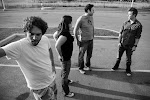“How We Exit - Gentleman Reg
“The Sun Is Coming Up And My Plane’s Coming Down” - Young Galaxy
“Glory” - The Acorn
“Rabbit In A Snare” - The Paper Cranes
“Don’t Talk Down” - The Stills
"Trouble On The Patio" - The Waking Eyes
"Immaculate Heart" - American Analog Set
"Not Moving At All" - Major Maker
"What Your Baby’s Been Doing?" - The Small Sins
“The Silence” - Cancel Winter
“Drugs” - Memory Bank
“Going, Going, Gone” - Stars
“Cool Kids Keep” - American Analog Set
“I Need A Friend” - The Small Sins
“What Princes Feel” - The Small Sins
“We’re In A Thunderstorm” - Gentleman Reg
“Being Here” - The Stills
“Number 12” - Memory Bank
"Last Goodbye" - Major Maker
“We Will Break Our Own Hearts” - The Small Sins
“Let Me Be Your Ferris Bueller” - The Carnations




